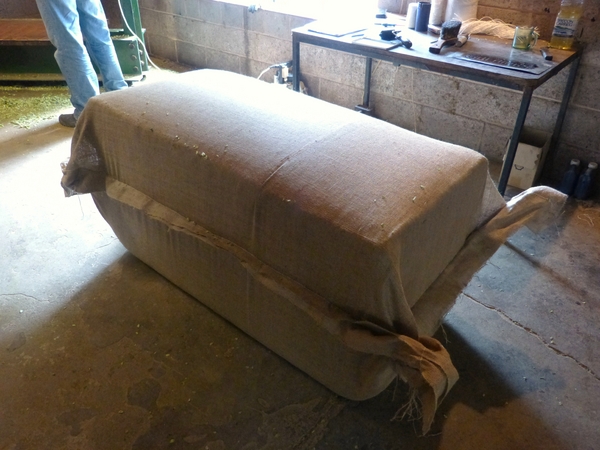Picking a fight: Ali Capper leads the battle to boost the fortunes of home-grown hops
Added: Wednesday, September 18th 2013
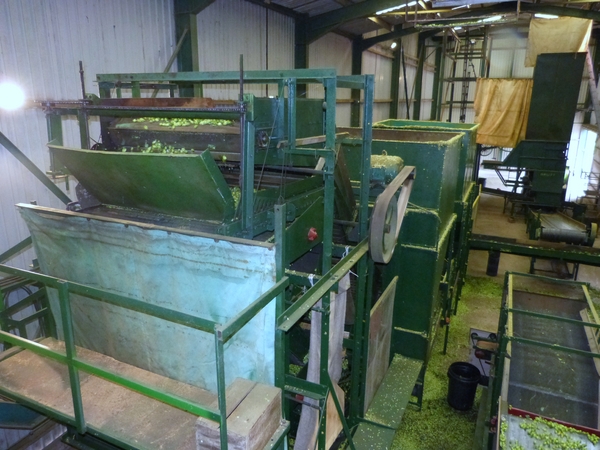
When 400 British brewers descended on Stocks Farm in Herefordshire in August to inspect the annual hop crop, farmer Ali Capper took a deep breath, stood up and made an impassioned plea for them to use more British hops. When she finished, the assembled brewers gave her a standing ovation.
Ali, who with her husband Richard farms 100 acres at Stocks Farm in Suckley, was moved by her reception. But now, she says, cheers have to be turned into sales.
Ali, a dynamo of activity, has transformed the industry by dropping the word “national” from the name of its governing body and changing it to the British Hop Association, complete with a new logo and website. She hopes the revised name will give it greater impact abroad. Both Ali and Richard have been worried by the inability of British hop growers to export their plants while American and New Zealand growers have turned their hops into “must buy” varieties for craft brewers.
When she went to Brauwelt, an international brewing convention in Nuremberg in Germany, she was horrified by the lack of knowledge of British hops. She spoke to 200 brewers from other countries and they expressed great interest in British hops when she explained their virtues to them.
As we slither and slide in her 4x4 round Stocks Farm in the autumn rain, with a cutting machine in the distance slicing two rows of hops, she says there are 23 different varieties grown in Britain. They offer a wide range of aromas and flavours that should suit brewers’ needs.
“The first dwarf hops were developed here in Herefordshire,” she points out. These varieties – also known as hedgerow or low trellis hops – grow to only half the height of conventional varieties. As a result, they are easier to pick and are less prone to the pests and disease that plague older varieties. Hedgerow hops are now being grown in other countries but Britain doesn’t get the credit...or the sales.
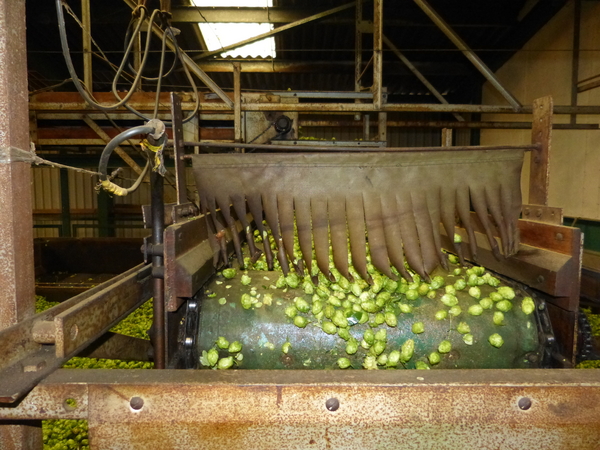
Ali is a Herefordshire farmer’s daughter. Richard Capper’s father bought Stocks Farm in the 1960s and he remains a partner in a business that grows hops and apples, and raises poultry. Ali explains that the heavy clay and sandstone soil is ideal for hop growing as it retains moisture and is very fertile “but when it’s wet, it’s hard to work. We don’t irrigate and that makes the soil more sustainable.”
American hop farmers in the Pacific North-west irrigate their fields while the Cappers were shocked to find New Zealand farmers using overhead irrigation. “That’s wasteful,” she says.
During the summer, working with the Marston’s brewing group and Dr Peter Darby of Wye Hops in Kent, the Cappers launched a new hedgerow variety called Endeavour. It’s a cross between an American Cascade and a new English low trellis hop and it offers a more restrained version of the citrus/grapefruit character of many American varieties that’s popular with British brewers.
Ali points out that many American beer drinkers are moving away from “extreme beers” with exaggerated citrus flavours. She thinks brewers in the U.S. could be encouraged to use the likes of Endeavour if they can be told about them and are able to buy them.
British hop growing, once a major industry, has been in decline for decades. There are only around 50 hop farms left in Britain, covering a total of 1,000 hectares and Stocks is one of the biggest three or four. Fifty per cent of Britain’s hops are grown in Herefordshire and neighbouring Worcestershire. The Cappers produce 80,000 kilos a year: “that’s 46 million pints of beer,” Ali helpfully points out.
Stocks Farms produces such traditional tall trellis varieties as Bramling Cross, Goldings, Phoenix, Pilgrim and Target along with three hedgerow varieties, Endeavour, First Gold and Sovereign.
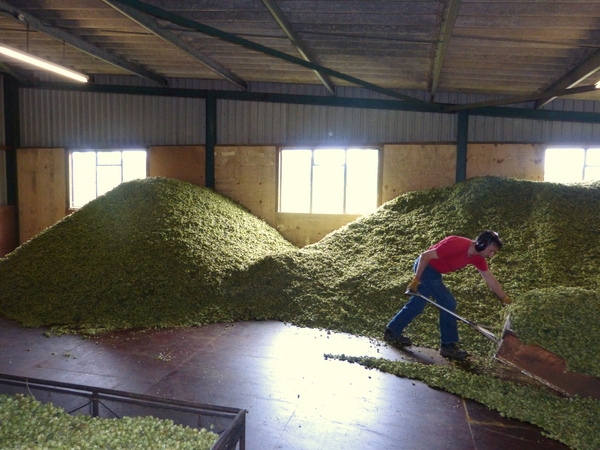
Picking will continue until the end of September and the full-time staff of four at Stocks swells to 15 to allow all the hops to be gathered in. A further 35 are employed to pick apples which are sold to both large and small cider producers as well as supermarkets. Caravans and cottages on the farm provide accommodation for the pickers, many of whom come from central and eastern Europe for the season.
After inspecting the hops in the fields, Ali leads the way to the enormous cutting shed that’s dominated by a puffing and heaving machine bearing the splendid name of Bruff (top image). It was invented and built in the village of Suckley and is sold throughout the world: the Cappers were delighted to find Bruffs operating in New Zealand.
As belts and pulleys heave and groan, the Victorian machine, devoid of computers and sat navs, miraculously separates the hops from leaves and bines. Ali explains that hops are heavier than leaves: the leaves go through a set of rollers but the hops are left behind.
The bright green hops are transferred to a warm, dimly-lit kiln next door (image above) where they have to be dried quickly: if the moisture isn’t removed, the plants will turn mouldy. A worker turns the piles of hops with a large shovel and takes a supply to a corner of the kiln where another ancient machine, rather like a dumb waiter, presses them into bales and drops them to the floor below (image below).
Over tea and a sandwich in the spacious farm house kitchen, Ali explains the harsh economics of growing hops. “Britain accounts for 1.6 per cent of world hop production,” she says. “In the U.S. farmers produce 32 per cent of world production. Their farms are 1,000 acres, not 100, so they have economies of scale.”
She was shocked when she visited the world-famous Hallertau hop-growing region of Bavaria, southern Germany, which accounts for 40 per cent of world hop growing.
“For the farmers there, hop growing is a hobby,” she says. “Many of them have second jobs – they work for BMW in Munich and look after their farms at weekends. They sell their hops for one euro a kilo – we can’t afford to sell at that price.”
British hop farmers have the highest labour costs in the world and “the price of oil has shot up in recent years. It costs £20,000 per hectare to grow hops and an investment of £½ million to start from scratch. We have to check every hop yard regularly to check for pests and disease.
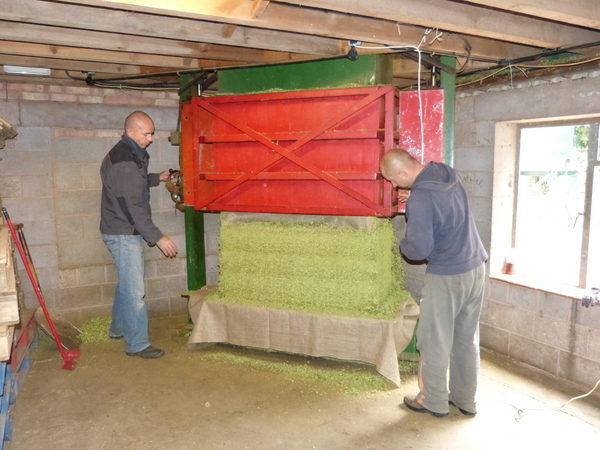
“We need a premium price for British hops as they’re a great niche product. They make beautifully balanced beers and our high aroma varieties, like Admiral and Phoenix, can compete in the modern arena.”
Ali and Richard – he was busy on the farm and was happy to leave his wife to do the talking – are determined to break in to the American craft brewing market. She is optimistic as, she points out, it’s cheaper for brewers in the east of the U.S. to import hops by sea from Europe than it is to buy them from Washington State and Oregon, where they have to be transported by road.
She frankly admits that a few years ago she and Richard sat down and discussed whether they should continue to grow hops as the income was so small.
“But we decided to give it a go. We grow hops in a maritime climate and our varieties are unique to us.”
Standing ovations aren’t sufficient. Ali Capper wants British brewers to use more British hops and to name the varieties on their labels and pump clips. It means abandoning the stiff upper lip and banging the drum to ensure there is a British hop industry left in 10 years’ time.
Image below: a finished bale of hops is ready to leave Stocks Farm.
